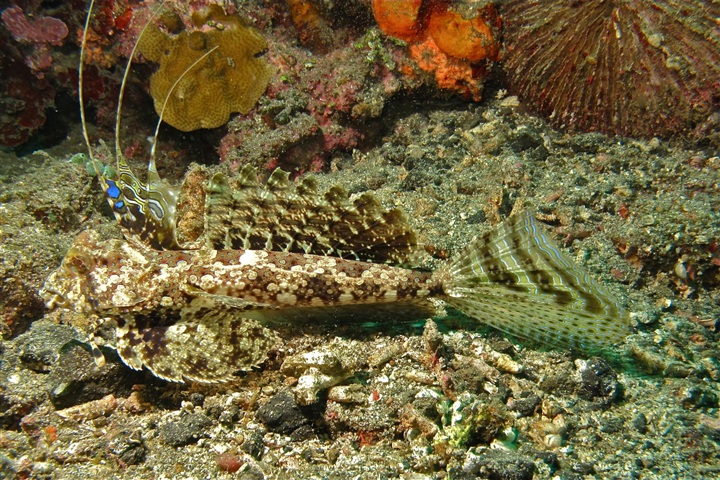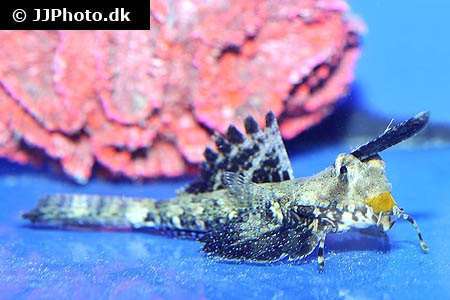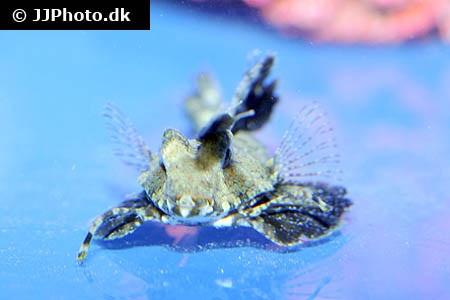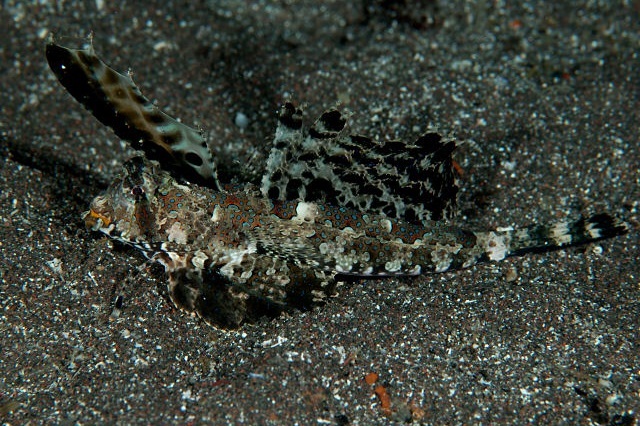Dactylopus dactylopus




| Latin name | Dactylopus dactylopus - (Valenciennes, 1837) |
|---|---|
| Local name | Fingered dragonet |
| Family | Callionymidae - Dactylopus |
| Origin | East Indian Ocean, Australia, Japan, Indonesia, New Zealand, Central/West Pacific |
| Max length | 30 cm (11.8") |
| Minimum volume |
500 l (132 gal) |
|---|---|
| Hardiness |
Average |
| Suitable for aquarium |
Suitable with care |
| Reef safe |
Always reef safe |
| Aggressiveness | Mostly peaceful but might be aggressive towards similar species |
| Recommended |
Small crustaceans (Krill, mysis, artemia...) Zooplankton (Cyclops, pods...) |
|---|---|
| Mostly |
Larger crustaceans (Shrimp, crabs...) |
| Maybee |
Fish |
This species thrives best in an aquarium with sufficient food on the live rocks. A large number of pods should be visible in the aquarium before acquiring this species.
If it is to be kept in a small or newly set up aquarium be prepared to supplement with live zooplankton. This is not recommended as it takes a lot of effort in order for the fish to thrive.
Some individuals learn, over time, to eat frozen food, but it is hard to supply them with enough. It must also be of high quality and sufficiently varied.
They are not particularly good at catching their food in the water column, especially if uninterested in it.
One should be very patient in order for this to function, or alternatively invest in an appropriate feeding device.
They can live as a pair provided they are introduced simultaneously.
Dragonets (Callionymidae) will keep to the bottom of the tank and between the rocks, and only rarely swim in open water.
They live of small pods on rocks. The species in this family are therefore best suited to aquaria with sufficient populations of pods. Because of this, Dragonets are best suited to tanks which have been active for about a year, or one where the tank is teeming with pods under the rocks.
These fish are, however, easy to keep and peaceful, if their food requirements are met.
Multiple Dragonets can be kept together, but one should avoid having two males at the same time. Males will normally have a stronger colour and the front dorsal fin is larger.
Be cautious about keeping Dragonets together with anemones, as one runs the risk of the anemones eating them.
These fish are extremely resistant to whitespot and other parasites, but are not completely immune. They cannot, however, tolerate copper and other types of medicine very well.
The fish should be active and in good condition when bought.
If one plans on trying to feed this fish replaqcement foods, because of lack of pods, look for a fish which already eats frozen food, at the dealer.
| Aquarium trade | Yes |
|---|---|
| Distribution | Western Pacific: Japan to Australia, including Guam and Palau. |
| English common names |
Fingered dragonet |
Bob Fenner. Mandarins, Psychedelic "Gobies", Dragonets, Scooter Blennies....YAH! Family Callionymidae - Wet Web Media - (English)
2008. Fish profile: Mandarinfish - Reefkeeping Magazine - (English)
Henry C. Schultz. 2005. Mandarin Medley - Reefkeeping Magazine - (English)
Matthew L. Wittenrich. 2010. Breeding Mandarins - Tropical Fish Hobbyist Magazine - (English)

